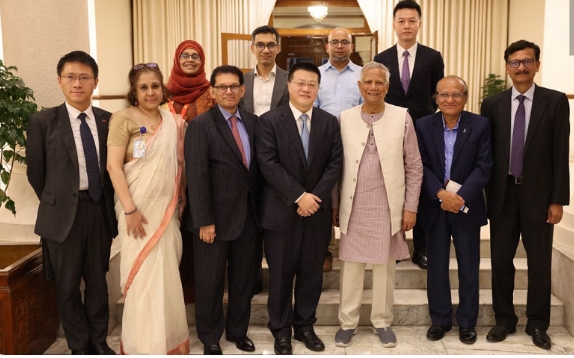
SATV 21 April, Kathmandu: Bangladesh and China yesterday expressed a shared commitment to transform recent high-level discussions into actionable projects across a range of sectors, including infrastructure, trade, healthcare, education, and culture.
"Our top priority now is to move forward with the plans we discussed during the China visit," Chief Adviser Professor Muhammad Yunus said at a meeting with Chinese Ambassador to Bangladesh Yao Wen at the State Guest House Jamuna, where they reviewed the outcomes of Yunus's recent visit to China and outlined the next steps for accelerating Bangladesh–China cooperation.
"We want to make sure the momentum is not lost," the chief adviser's deputy press secretary Apurba Jahangir quoted him as saying.
The Chinese ambassador echoed Yunus's sentiment: "This is also our top priority. We had one of the highest-level agenda meetings in China, and we do not want to wait another two to three years just to sign agreements -- we want to implement them quickly."
One of the topics discussed was the development of the Mongla and Anowara economic zones.
Bangladesh Investment Development Authority Executive Chairman Chowdhury Ashik Mahmud Bin Harun said preparations are underway and, once completed, the zones will be handed over to developers to begin implementation.
Both sides reaffirmed their commitment to launching a long-term 50-year master plan on water management, including work on the Teesta River system.
They also discussed a plan to procure four new vessels from China, with the Chinese side assuring that the process would be completed by June this year.
The Chinese ambassador further stated that China's commerce minister will visit Bangladesh soon, accompanied by a 100-member delegation of investors aiming to explore new investment opportunities.
"We will organise a mini-investment summit focused on Chinese investors to strengthen sector-specific collaboration," said Ashik.
Healthcare cooperation featured prominently in the discussions.
The Chinese side reaffirmed their commitment to building a 1,000-bed hospital in Bangladesh, as initially proposed during the China visit. They also highlighted ongoing support for the establishment of a specialised burn unit in Chattogram.
Chinese Ambassador Yao Wen said progress is being made to launch a direct Kunming–Chattogram flight, and efforts are underway to expedite medical visas for Bangladeshi patients.
The chief adviser stressed the importance of cultural exchange, proposing the establishment of a Chinese Cultural Centre and Language Institute to enable young Bangladeshis to engage more closely with Chinese language and culture.
Yunus also raised the possibility of expanding jute exports to China and urged greater Chinese investment in the locomotive sector. He proposed setting up locomotive manufacturing and maintenance hubs in both Chattogram and Saidpur, alongside capacity-building workshops and training programmes.
Agricultural trade was another area of progress. Bangladesh will begin exporting mangoes to China this season, with jackfruit exports scheduled for next year. "I'll send a basket of fresh mangoes to President Xi myself," said Yunus.
The meeting was also attended by Foreign Adviser Md Touhid Hossain, National Security Adviser Dr Khalliur Rahman, BIDA chairman Ashik Mahmud Bin Harun, special assistant Faiz Taieb, cabinet secretary Siraz Uddin Miah, and SDGs affairs principal coordinator Lamiya Morshed.



